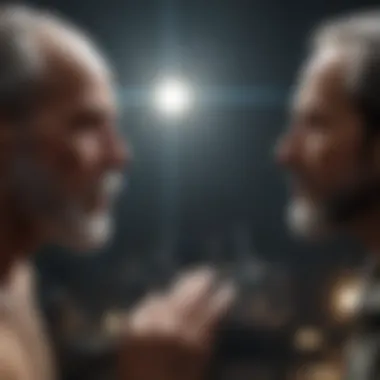Exploring Evolution and Religion: A Comprehensive Study


Intro
The relationship between the theory of evolution and religion is both complex and multifaceted. The discussion encompasses a broad range of beliefs, historical contexts, and scientific principles. As such, it prompts critical inquiry into how these two domains intersect, conflict, or even complement one another. In shedding light on this intricate interplay, one gains a deeper understanding of their implications for education, faith, and societal development.
This article aims to explore these themes in depth, presenting a nuanced perspective aimed at students, researchers, educators, and professionals who seek to navigate the complicated dialogue surrounding evolution and religion. By examining historical viewpoints, significant scientific findings, and theological responses, this inquiry offers a comprehensive guide to understanding how these spheres interact in contemporary discourse.
Intro
The exploration of the intersection between evolutionary theory and religion is significant for understanding both scientific and spiritual perspectives. This discussion is relevant in various spheres, including education, personal belief systems, and public policy. As human societies evolve, debates surrounding these domains often surface, revealing underlying assumptions, fears, and aspirations. By addressing how these two fields interact, we can gain a clearer insight into critical dialogues that shape our world.
One of the primary benefits of examining this intersection lies in the potential for dialogue. Engaging with diverse viewpoints fosters empathy and encourages critical thinking. Furthermore, the implications extend beyond academia into everyday life, affecting how biological sciences are taught, how beliefs influence community dynamics, and how both realms can coexist or clash.
In this article, we will provide a thorough investigation into the principles of evolution, the foundational aspects of religion, and the tensions that exist between them. By doing so, we aim to clarify common misconceptions, highlight pivotal historical moments, and discuss relevant contemporary issues. This inquiry serves both as a foundational piece for students and as a resource for educators and professionals seeking to navigate the nuanced relationship between faith and scientific understanding.
Overview of Evolutionary Theory
Evolutionary theory encompasses a wide range of topics, primarily focusing on the mechanisms by which species adapt and change over time. Central to this theory is the concept of natural selection, postulated by Charles Darwin in the 19th century. It explains how certain traits become more prevalent within populations based on their advantages in survival and reproduction.
Apart from natural selection, evolutionary theory includes genetic variation and mutation, which underpin diversity within species. These factors are crucial for the process of speciation—the development of new species through evolutionary change. Such a framework not only explains biological phenomena but also engages with broader philosophical questions regarding life's origins and the complexity of living organisms. The comprehensive nature of this theory invites an exploration of how it intersects with various religious beliefs and creation narratives, posing both challenges and opportunities for integration.
Definition and Scope of Religion
Religion can be defined as a set of beliefs, practices, and values centered around questions of existence, the nature of the universe, and the divine. This domain is inherently broad, encompassing various faiths, traditions, and interpretations. Each religion often offers a framework for understanding human life and creating meaning within it.
The scope of religion extends beyond mere belief in a deity. It includes community practices, ethical guidelines, and cultural rituals that shape identities. In the context of evolution, religious systems may present distinct narratives about creation, existence, and humanity’s role in the universe. These narratives can either support or oppose scientific explanations, leading to a complex dialogue characterized by both conflict and synergy.
By analyzing these perspectives, we can better understand how religious beliefs can influence perceptions of scientific concepts. This understanding is vital for fostering respectful discourse and intellectual growth in a world where the separation between science and faith continues to be a prominent theme.
Historical Context
Understanding the historical context behind the theory of evolution and religion is crucial for comprehending the intricate relationship between these two domains. This section illuminates how past beliefs shaped current perspectives, emphasizing the evolution of thought in response to scientific discoveries. By tracing the roots of creation theories and examining the landmark publication of Charles Darwin's work, we can appreciate how history informs contemporary debates. It helps to clarify the positions held by religious authorities and the significant shifts in public opinion that ensued.
Early Theories of Creation
Before the acceptance of evolution, many cultures adhered to various creation myths that sought to explain the origins of life. These narratives often reflected the values and beliefs of the societies that created them. For instance, in the Judeo-Christian tradition, the Genesis account provides a description of divine creation in six days, which contrasts sharply with evolutionary theory.
These early theories typically posited that life was designed with purpose. They prioritized an intelligent creator, emphasizing order and intentionality in the universe. Various ancient civilizations, such as the Greeks and Egyptians, also had distinct creation myths which included gods and supernatural events as central to their explanations.
In essence, these narratives offered comfort and a sense of belonging, serving as frameworks within which humanity could understand their existence. This foundational context is essential, as it sets the stage for the challenges and conflicts that would arise with the advent of scientific inquiry.
Darwin and the Publication of 'On the Origin of Species'
The publication of Charles Darwin's "On the Origin of Species" in 1859 marked a watershed moment in the intersection of evolution and religion. Darwin proposed a mechanism for evolution—natural selection—that contrasted with the idea of divine creation. His work presented compelling evidence for the gradual change of species over time, fundamentally challenging established beliefs about the origins of life.
Darwin's observations culled from his voyage on the HMS Beagle provided a scientific basis for understanding biodiversity. They demonstrated that species adapt to their environments through a process of survival and reproduction. His assertions confirmed ideas already hinted at by earlier naturalists but presented in a systematic and evidential manner that would resound throughout the scientific community.
The ramifications of Darwin's theories were profound, leading to debates not only within scientific circles but also within religious institutions. The work drew criticism from various fronts, as it called into question the literal interpretations of sacred texts. For many, Darwin's ideas represented an existential threat to faith, igniting a fierce struggle between science and religious doctrine.


Responses from Religious Authorities
In the wake of Darwin's publication, religious authorities grappled with the implications of evolutionary theory. These responses varied significantly across different faiths and denominations. Some embraced evolutionary ideas, arguing that they could coexist with their religious beliefs. Others, particularly fundamentalist groups, rejected Darwinism outright, advocating for a strict interpretation of creation narratives.
Prominent figures in the theological community began to engage with Darwin's theories. For example, the Catholic Church, over time, announced a more reconciliatory stance towards evolutionary science, acknowledging that faith and reason need not be in opposition.
However, resistance remained strong in certain sects. This ongoing tension led to debates about the inclusion of evolution in educational curricula, affecting how future generations understood the relationship between science and religion. Resistance to Darwinism often outwardly manifested, influencing public policy and education concerning biological sciences.
"The conflict between religion and science will continue as theories evolve, echoing through history and impacting societal norms and educational frameworks."
Thus, the responses from religious authorities highlight the complexity of integrating scientific advancements with traditional beliefs. This historical perspective underscores the ongoing dialogue surrounding evolution and religion, emphasizing how deeply historical events shape current narratives.
Principles of Evolution
Understanding the principles of evolution is pivotal in exploring the dialogue between evolutionary theory and religious beliefs. These principles outline the processes that drive the diversity of life, each contributing a unique perspective on how species adapt, survive, and change over time. A comprehensive examination of evolutionary principles provides insight into how these concepts can coexist with various religious interpretations or, conversely, lead to conflict.
Natural Selection
Natural selection serves as a cornerstone of evolutionary theory. Proposed by Charles Darwin, this principle explains how certain traits become more common in a population over generations. Organisms with advantageous traits are more likely to survive and reproduce, thus passing those traits on to future generations. The concept is built on three fundamental observations:
- Variation: Individuals within a species have differing traits.
- Inheritance: Some of these traits are heritable and passed to offspring.
- Differential survival: Individuals with favorable traits are more likely to survive to reproductive age.
This process aids in understanding biological adaptation and the intricate relationship between organisms and their environments. In examining natural selection, one can see how these concepts challenge some literal interpretations of creation found in religious texts, which often emphasize a static view of creation. By acknowledging the validity of natural selection, dialogue between evolutionary science and religious belief may become more productive.
Genetic Variation and Mutation
Genetic variation is essential for natural selection to occur. Variations arise from mutations, which are changes in the DNA sequence of an organism. These changes can be beneficial, harmful, or neutral.
- Beneficial mutations provide organisms with traits that improve their chances of survival.
- Harmful mutations may lead to disadvantages, affecting an organism's ability to thrive.
- Neutral mutations do not significantly impact an organism's fitness.
Mutations introduce new traits into a population, creating the diversity on which natural selection acts. Understanding this principle is crucial for both evolutionary biology and religious discourse. Many religious interpretations may struggle with the idea that mutations can lead to significant changes in life forms over time. Recognizing that variation is a natural part of life can promote a more harmonious relationship between science and faith, as both can acknowledge processes that lead to the diversity of life.
Speciation and Adaptive Radiation
Speciation refers to the formation of new and distinct species in the course of evolution. It often occurs when populations become isolated from each other—either geographically or reproductively—leading to divergent evolutionary paths. An example of this is the finches observed by Darwin in the Galápagos Islands, where different species adapted to various environmental challenges.
- Adaptive radiation occurs when a single ancestor species rapidly diversifies into a variety of forms to adapt to different environments. This is evident in the evolution of mammals after the extinction of dinosaurs, where numerous mammal species adapted to fill various ecological niches.
The implications of these principles extend to how religious narratives may interpret the origin of species and diversity in life forms. By allowing for a dynamic understanding of life's changes, religious frameworks may find common ground with evolutionary science. This cooperation could create a richer understanding of existence, where both science and spirituality provide insights into life's complexity.
"Understanding evolution is not about choosing between science and faith; it is about recognizing how both can offer valuable perspectives on the world we inhabit."
Core Religious Beliefs
The examination of core religious beliefs is central to understanding how these systems of faith interact with the theory of evolution. These beliefs often influence not only interpretation of religious texts, but also shape one’s perspective on science and its findings. Many religious traditions provide frameworks that define existence, purpose, and morality. In assessing the intersections between religion and evolution, it becomes clear that these core beliefs can either facilitate a dialogue or create significant barriers.
Creation Narratives in Various Religions
Creation narratives are foundational to many religious traditions. They offer explanations for the origins of the universe, life, and humanity. For example, in Christianity, the Book of Genesis describes God creating the world in six days. Similarly, in Hinduism, there are multiple creation stories that reflect its complex cosmology. Buddhism tends not to emphasize a creator deity, focusing instead on the processes of existence and suffering.


These narratives provide believers with meaning and identity. However, when faced with scientific explanations such as the Big Bang theory or evolution, tensions can arise. Some adherents may feel their faith is threatened by scientific claims. Other believers interpret these narratives more figuratively, suggesting that religious texts are not meant to be literal accounts of history. This divergence illustrates the adaptability of religious beliefs in the face of scientific advancement.
"Science does not replace faith but rather can deepen our understanding of the divine, allowing for a profound appreciation of creation."
Fundamentalism and Acceptance of Science
Fundamentalism represents a strict adherence to specific religious doctrines. For many fundamentalist groups, there is little room for reconciling scientific theories with religious texts. This rigid perspective often leads to outright rejection of evolutionary theory, as seen in certain Christian sects advocating for Creationism. They argue against scientific conclusions, claiming these contradict their literal interpretations of sacred texts.
On the other hand, there are many religious individuals and groups who find ways to integrate science with their beliefs. For instance, some theologians argue for the compatibility of evolution with religious faith, suggesting that God could work through natural processes. This viewpoint, often referred to as theistic evolution, emphasizes that science and religion can coexist without undermining one another.
This divide reflects broader implications for education and societal discourse. As discussions about the role of science in public schools continue, understanding these core religious beliefs will remain crucial. It showcases the varying approaches to knowledge and existence, revealing a landscape where faith and scientific inquiry frequently clash but can also harmonize.
Points of Conflict
The relationship between evolution and religion has always been marked by significant points of conflict. This section aims to illuminate these conflicts, focusing particularly on literal interpretations of sacred texts versus scientific evidence, and the ongoing debates within educational systems. Understanding these conflicts is essential for grasping the broader dynamics that shape discussions on science and faith today.
Literal Interpretation vs. Scientific Evidence
One of the most apparent conflicts arises from the literal interpretation of religious texts, especially concerning creation stories. Many religious individuals view the scriptures as infallible accounts of the origins of life. This position often puts them at odds with evolutionary theory, which is based on empirical evidence and scientific methodologies.
The tension increases with doctrines in religions such as Christianity and Islam, where creation narratives can conflict with the evidence of evolution. For some adherents, accepting evolution threatens the fundamental beliefs in divine creation. This kind of stance invariably leads to a rejection of scientific evidence that contradicts their interpretations of sacred texts, such as fossil records and genetic studies.
On the other hand, many religious scholars choose to interpret these texts from a non-literal perspective. They propose that sacred writings can coexist with scientific understanding, suggesting that these texts aim to convey moral and spiritual truths rather than historical or scientific facts. This leads to a more contentious theological dialogue, as those with rigid literal views feel that such interpretations dilute their faith.
"The clash between science and religion comes from differing epistemologies, yet both seek to answer the same fundamental questions about existence."
One cannot ignore the positive aspect of this conflict. It can lead to a robust dialogue, fostering deep discussions around fundamental questions of existence, purpose, and the nature of knowledge itself. This discourse prompts believers to reassess their understandings in light of scientific advancements, possibly leading to a more refined coexistence between faith and scientific inquiry.
Debates in Public Education
The points of conflict extend into the realm of public education, where debates often become heated. In many regions, discussions about whether to teach evolution as the primary scientific explanation for biological diversity versus creationism or intelligent design illustrate these tensions.
Several key aspects emerge from the educational debate:
- Curriculum Content: In some educational systems, there is ongoing resistance to include the theory of evolution in science curricula, arguing instead for alternative theories rooted in religious beliefs.
- Legal Battles: Courts have often had to intervene in disputes over how evolution is presented in public schools. For instance, landmark cases like Kitzmiller v. Dover Area School District emphasized the need for science education to remain secular.
- Impact on Students: The conflicts in educational settings can significantly affect students' understanding of science and their confidence in pursuing scientific studies. This also shapes their worldviews, often leading to confusion about the relationship between faith and science.
In light of these debates, educational institutions bear a responsibility. They must facilitate an environment that honors free inquiry and promotes scientifically sound information, while also respecting diverse religious beliefs. Striking a balance is crucial, for these discussions have implications that reach far beyond school walls, influencing societal views and the future of scientific literacy.
Collaborative Perspectives
The concept of collaborative perspectives between the theory of evolution and religion is vital in this discourse. It goes beyond mere coexistence, aiming to bridge gaps between two seemingly opposing paradigms. Understanding this intersection offers potential benefits for both scientific inquiry and spiritual beliefs. Collaborative perspectives can facilitate dialogue and enhance mutual understanding, which is crucial in today's diverse society.
Theistic Evolution
Theistic evolution presents a framework where faith and evolutionary biology coexist without negating each other. This perspective posits that God uses evolution as a means to create life. People who subscribe to theistic evolution do not see a contradiction between their religious beliefs and scientific evidence. Instead, they interpret the biblical accounts of creation metaphorically, allowing for a compatibility with scientific findings.
Within this view, several key points can be observed:


- Divine Guidance: Proponents argue that the processes of natural selection and genetic variation are guided by a divine presence, thus integrating faith with science.
- Faith in Science: Theistic evolutionists maintain that acceptance of evolution does not diminish one’s faith but enriches their understanding of creation. They view scientific exploration as a pathway to comprehend divine intentions.
- Community: Many religious communities adopt this perspective, fostering an environment where both scientific inquiry and religious teaching are respected. This promotes a harmonious coexistence that can be beneficial in educational settings.
Integration of Science and Religion
Integrating science and religion is about finding common ground in understanding life and the universe. This interaction encourages an appreciation for both empirical evidence and spiritual beliefs. For many, this integration does not imply compromising either field; instead, it advocates for a dialogue that honors both the methodologies of science and the mystique of faith.
Key dimensions of this integration include:
- Shared Values: Both domains often pursue truth, albeit through different methods. Emphasizing shared objectives can foster a collaborative spirit.
- Ethical Considerations: The integration of science with religion raises important ethical questions. For example, discussions about genetic engineering can benefit from religious insights about human dignity and morality.
- Educational Models: By showcasing examples where science and faith coexist, educators can create curricula that respect diverse beliefs while teaching scientific principles. This can produce a more well-rounded understanding of evolution among students.
"Integrating science and religion allows us to approach the mysteries of existence with a multifaceted perspective, blending empirical data with personal experience and belief."
Ultimately, the collaborative perspectives surrounding the theory of evolution and religion highlight the potential for constructive dialogue. This dialogue can lead to a more profound understanding of life, encourage respectful debate, and promote interdisciplinary cooperation.
Implications for Modern Society
The implications of the intersection between evolutionary theory and religious belief systems are profound and multifaceted. Understanding this topic is critical, especially in a world where scientific literacy and religious beliefs often influence societal norms and policies. The emphasis here is not just on conflict but also on potential avenues for cooperation and mutual understanding in various contexts.
Impact on Scientific Research
The relationship between evolution and religion notably impacts scientific research in various fields. Researchers often grapple with their personal beliefs while conducting their studies. This intersection can lead to both innovative collaborations and notable challenges.
- Funding and Support: Many scientific endeavors receive funding from religious organizations. This can shape the research agenda, raising ethical questions regarding objectivity and purpose.
- Public Perception: Researchers must consider how their findings are perceived by the public. For instance, discoveries in genetics may be resisted by communities holding strong creationist views, making discussion and collaboration regarding research outcomes crucial.
- Conservation and Bioethics: Understanding evolution is essential for conservation biology. Religious groups can play pivotal roles by advocating for environmental stewardship rooted in both scientific and moral frameworks.
The discourse around these topics encourages scientists to communicate their work effectively to explain both the methodology and the implications of their findings to a lay audience. This effort can enhance public support for scientific research and promote a more informed population.
Influence on Ethical and Moral Frameworks
Another significant consideration is how the theory of evolution informs and interacts with ethical and moral frameworks within society. Many religious traditions emphasize a moral order created by a divine power, while evolutionary theory often suggests morality is an adaptive trait, evolved for social cohesion.
- Ethical Behavior: An understanding of evolution can influence views on ethical behavior. Some argue that principles of fairness and cooperation have biological underpinnings, potentially shifting perspectives on moral responsibility.
- Bioethical Concerns: Topics such as genetics and artificial intelligence bring evolving ethical questions to the forefront. Religious beliefs often provide a moral compass in these debates, highlighting the need for dialogue that respects differing viewpoints on life and humanity.
- Social Justice Movements: The intersection of evolution and religion can drive social justice efforts. Many religious communities advocate for human dignity and equality, which resonate with evolutionary principles that promote solidarity and community.
To navigate these complex ethical frameworks effectively, it is essential for all parties—scientific, religious, and societal—to engage in constructive dialogue. Such interaction can lead to a better collective understanding of human values in the light of scientific advancement.
"The dialogue between science and religion remains vital in addressing moral and ethical questions that arise from ongoing scientific discoveries."
Addressing the implications of evolutionary theory and religion on modern society encourages critical reflection about how these two powerful systems of thought can coexist, offering pathways toward understanding that enriches both domains.
End
Understanding the intersection of the theory of evolution and religion is paramount in today’s academic landscape. It is essential due to the profound implications these domains hold for society, education, and individual beliefs. In this article, the critical examination of how evolution and religious thought intersect highlights several specific elements: the historical context, the conflicting views, and the potential for reconciliation. This inquiry fosters a nuanced perspective that acknowledges diversity in thought, encourages dialogue, and furthers understanding between seemingly opposing fields.
Summary of Key Points
The core themes explored in this article include:
- The historical relationship between early creation theories and subsequent evolutionary theories.
- How Charles Darwin's work has influenced religious perspectives.
- The evident conflicts arising from literal interpretations of sacred texts when faced with scientific evidence.
- The concept of theistic evolution, which proposes a middle ground between belief and science.
- The implications of these discussions on scientific research, education, and moral frameworks in society.
These points underscore the complexity of integrating these significant bodies of thought and the ongoing relevance of the discourse in education and community dialogues.
Future Directions for Dialogue
Moving forward, several avenues warrant exploration and consideration:
- Greater emphasis on interdisciplinary studies that include both scientific and religious perspectives can lead to a more inclusive understanding.
- Public education initiatives should focus on fostering critical thinking, where students can engage with both evolution and religious teachings analytically.
- Discussions surrounding ethical implications of evolutionary theory in conjunction with religious beliefs must be prioritized, especially in relation to topics such as bioethics and environmental stewardship.







